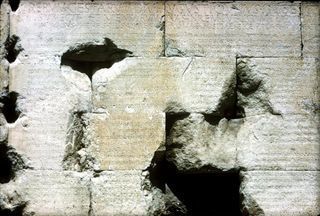A nice new fragment of Augustus' Res Gestae -- so there!
OK, this is a niche blog post. But it's what I've got curious about just now, and it's a nice example of the little ways in which the story of the classical world gets changed -- so let's share it.
One of the most extraordinary documents to survive from the ancient world is the "autobiography" of the first emperor Augustus (text here). This was originally written by (or for) the emperor himself, and inscribed on bronze pillars in front of his tomb after his death.
Those don't survive, but in the nineteenth century a largely complete bi-lingual copy, in Latin and Greek, was discovered in the Temple of "Augustus and Rome" in Ankara (above), also inscribed post mortem. This has become one of the most important documents in the whole of ancient history, and not surprisingly. It's a first person account by a Roman emperor, but not just any emperor --but by the young thug who slaughtered his enemies (Octavian), then re-invented himself as founding father (Augustus) of a paternalistic autocracy. (Mussolini had the whole Latin text inscribed on retaining wall of his reconstructed Ara Pacis, just next to the emperor's Mausoleum -- preserved in the new reconstruction.)
I teach the Res Gestae a lot.. in fact it's a "set text" for the students on our 4 year course who come to Cambridge to do Latin and Greek from scratch (the Latin of the RG is quite easy).
And now there is a new fragment of this amazing document, which takes away some of the things I've usually said about it.
The point is that fragments of other inscribed copies of the RG survive: one from Antioch (not the town in Syria) and one from Apollonia. And the puzzle is that, putting Ankara together with these two, ALL the publicly inscribed copies of the text seemed to come from the province of Galatia (in modern Turkey).
And here has started a lot of talks with the students. Is this chance? Or is it showing different patterns in the dissemination of information in the Roman world (that is, was the governor of Galatia particularly keen on this kind of display of the dead emperor's achievements?.. or was the "Augustan" status of Galatia something to do with it? ).
Well a new article by Peter Thonemann in Historia 2012 puts the kibosh on that. Because he has realised that a tiny and otherwise insignificant fragment of Greek text published in 1932 in a volume of the inscriptions of the town of Sardis (Buckler and Robinson, 1932) was actually (as Buckler in an unpublished letter had already suspected) a small fragment of the Res Gestae. And Sardis is not in the province of Galatia, but in the province of Asia.
So the Galatian particularity no longer stands.And it makes you wonder exactly how widely through the empire the Res Gestae were originally disseminated.
So there's a new bit of stuff for me -- and the students -- to get their/our teeth into.
On such little fragments big ideas can be built...or may be.
Mary Beard's Blog
- Mary Beard's profile
- 4114 followers




